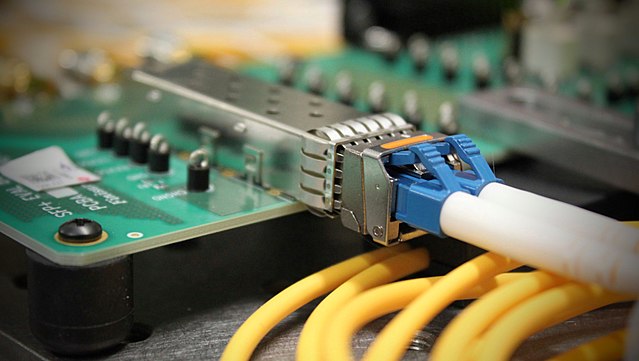Small Form-factor Pluggable
Small Form-factor Pluggable (SFP) is a compact, hot-pluggable network interface module format used for both telecommunication and data communications applications. An SFP interface on networking hardware is a modular slot for a media-specific transceiver, such as for a fiber-optic cable or a copper cable. The advantage of using SFPs compared to fixed interfaces is that individual ports can be equipped with different types of transceivers as required, with the majority including optical line terminals, network cards, switches and routers.
Small Form-factor Pluggable connected to a pair of fiber-optic cables
A 10 Gigabit Ethernet XFP transceiver, top, and a SFP+ transceiver, bottom
QSFP+ 40 Gb transceiver
Ethernet switch with two empty SFP slots (lower left)
In radio communication, a transceiver is an electronic device which is a combination of a radio transmitter and a receiver, hence the name. It can both transmit and receive radio waves using an antenna, for communication purposes. These two related functions are often combined in a single device to reduce manufacturing costs. The term is also used for other devices which can both transmit and receive through a communications channel, such as optical transceivers which transmit and receive light in optical fiber systems, and bus transceivers which transmit and receive digital data in computer data buses.
A decapped integrated circuit of a transceiver used in handheld communication devices and radio equipment as a modem extension. On-die passfilters are visible.
100BASE-TX connected to a 100BASE-FX transceiver






